
James O'Brien 10am - 1pm
14 February 2019, 07:54 | Updated: 14 February 2019, 14:47
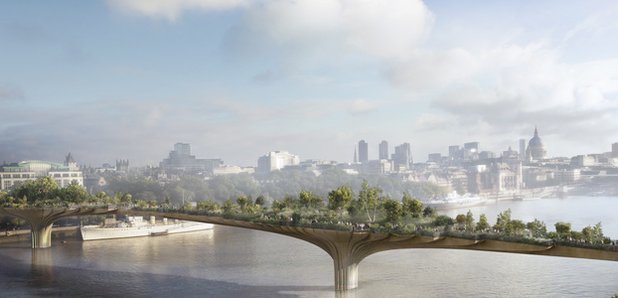
The Garden Bridge project has been scrapped, at a loss of nearly £43 million to taxpayers. This is the full, remarkable story of how London's "floating paradise" floundered.
AN LBC INVESTIGATION
It was during LBC's State Of London debate in 2017 that Mayor Sadiq Khan realised just how much Londoners disliked the idea of a tree-lined bridge being build.
Prior to this, the Mayor was insisting that it will be better value for taxpayers if the Garden Bridge went ahead - as almost £40million had already been spent on the project.
But when James O'Brien asked the 2,000 crowd their thoughts, the response was overwhelming and Mr Khan changed his mind.
It had been Boris Johnson's big project, with backing from George Osborne. But with both no longer in position, the bridge collapsed.
This is the full, remarkable story of the controversial Garden Bridge. LBC's Political Editor Theo Usherwood reports.
*****
It was back in 1998 that the actress Joanna Lumley first talked about the idea of a "floating paradise", crossing the River Thames as a memorial to Diana, Princess of Wales - a tiara for the Thames.
However the idea did not initially take off and it was not until 2012 that the idea began to gain momentum.
In an interview in 2014, Lumley told me how she dreamed of a new park traversing her beloved river, which harked back memories of the mist-covered mountain gardens of Malaysia, where she lived as a child.
"I think we're going to see such a huge regeneration, particularly on the north bank," she told Theo. "Particularly on this huge and terribly grand area, which has somehow got overlooked by London, which is the south side of the Aldwych, the straight side of the Aldwych, The Strand."
Boris Johnson had wanted the bridge to become his legacy to the capital, the big project that he could call his own.
He received credit for both the Olympics and for Boris bikes, but both of those were begun under his predecessor Ken Livingstone.
The Greenwich cable car is definitely his own project, but was unpopular and little-used. One report suggested just four commuters used it daily.
But London's answer to New York's High Line, a tree-lined bridge with meandering walkways designed by the man behind the Olympic cauldron, this was a thing that would be a testament to Boris's eight years as Mayor. But as Mr Johnson left office, that plan appeared to be unravelling.
But it’s those two years from 2012 to 2014 when Mr Heatherwick was selected to design the bridge, which has now become to focal point for campaigners unhappy at the way they perceive Mr Heatherwick’s design was selected.
*****
The first issue centres on a trip by Boris, his chief-of-staff Sir Edward Lister and the deputy mayor for Transport Isabel Dedring on the 3rd, 4th and 5th of February 2013.
It was a £9,000 trip to the headquarters of Apple just outside San Francisco to drum up sponsorship for the bridge.
Also at that meeting was Thomas Heatherwick, who Boris insisted had just happened to be in San Francisco at the same time and was invited to the meeting by Boris to discuss the “concept” of his design.
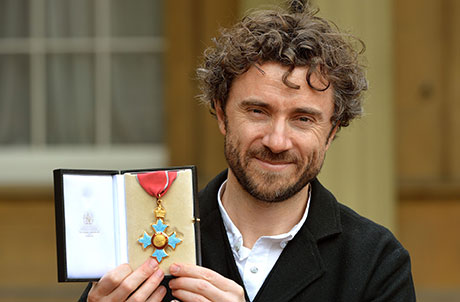
But what has since emerged is that Transport for London had not even issued the documents inviting other architects to bid to design the bridge.
That did not happen until February 13, 2013, eight days after the trip. And when that document was released, it only said there was a requirement for a new footbridge across the Thames. No mention was made of a Garden Bridge.
The problem for Boris is that he initially claimed that trip was private, rather than a business trip as mayor – a fact he denied when he spoke to Nick Ferrari during his monthly phone-in show.
That was despite his diary for the month of February 2013 - released under Freedom of Information laws - specifically stating the trip to San Francisco was private.

*****
Boris Johnson took part in Ask Boris shows on LBC for the full eight years of his time as Mayor of London. And even under the toughest of questioning, his charm has got him through some difficult moments.
But he will still be having nightmares about the 12-minute segment on 2nd February this year when he struggled to find the answers to Nick Ferrari's forensic questioning about the Garden Bridge.
When first Nick, then LBC caller Michael in Lambeth queried Heatherwick's victory in the procurement process, Boris got ruffled and increasingly uncomfortable as he attempted to defend the project.
Nick started: "The fact that he's [Thomas Heatherwick] sitting down with potential sponsors and other rivals that are bidding for it are not being made aware of it. That's not preferential treatment?
"You were a journalist of considerable note at one point in your career. Do you not think this starts to smell?"
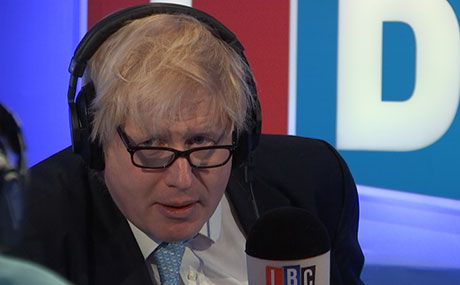
The Mayor hit back: "The Garden Bridge is ringed with demented enemies, who do not want to see something beautiful established in the centre of London."
Caller Michael insisted: "You kept the entire TfL board in the dark. You are the chair. You didn't report anything to them until six months after your San Francisco trip.
"One of your own TfL board actually came and complained to us that they had not been informed about this. That's how serious this is."
*****
Then attention turned to the “scorecard” for the Garden Bridge.
It’s well known that for large infrastructure projects like this one, a panel of experts is assembled to pick the right design and ensure there are no accusations of unfairness or bias.
But in this case, only one man was in charge of the architecture part of the contract – Transport for London’s Managing Director of Planning, Richard de Cani.
The bid that was submitted following the TfL request came from Heatherwick Studios, but there are now questions raised in City Hall about the involvement of the engineers Arup, who have so far received £8.3 million of tax-payers’ money to deliver the bridge.
In an interview back in 1998, Joanna Lumley had talked to Arup about the possibility of a Garden Bridge. And in July 2013, a press release from Arup stated it had been working with Heatherwick Studios to develop a Garden Bridge.
But what has come to light after an investigation by LBC is that Richard de Cani worked for Arup prior to joining Transport for London.
And he has now left TfL in May... to re-join Arup.
A TfL Spokesperson told us: "Richard has worked at TfL for 17 years and has been involved in hundreds of procurements. Any suggestion of improper involvement in either procurement contract for the Garden Bridge is completely unfounded.
"Richard was not involved in the scoring of the technical procurement, which was awarded to Arup. Once Arup was shortlisted, Richard was part of a wide-ranging panel that took the decision to award the contract to Arup.
"We are satisfied that the procurement processes for the Garden Bridge were fair and transparent. An extensive and thorough review was undertaken by a separate audit team, which concluded the procurement for the Garden Bridge was acceptable in relation to the selection of bidders."
But Jane Duncan, president of the Royal Institute of British Architects, has raised concerns about the scoring system – and the fact that it was only done by one man.
For the bridge contract, going up against Heatherwick were the architects Wilkinson Eyre and Marks Barfield.
This is the scorecard.
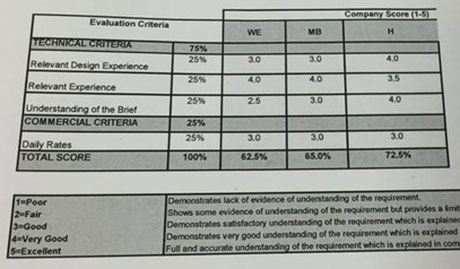
Heatherwick came out on top in the “experience category”, despite having only designed one bridge – which was not over water. His rivals had each designed several.
In the “understanding of brief”, again Heatherwick clearly came out on top. His design apparently matched the brief despite no mention of a Garden Bridge in the TfL document, which invited architects to come up with a simple footbridge.
And then there is value for money: that was scored as evens, despite Heatherwick's bid initially coming in at £173,000 - nearly £125,000 more than his closest rival.
*****
To make matters worse for the Mayor and the Garden Bridge Trust it has also come to light that were are secret contingency plans to turn the bridge into a pier.
Boris wanted work to get underway before he left City Hall in May to ensure the project would go ahead. That was despite consent for the south side “landing” site still not being given.
Indeed, planners were so worried they will not receive that consent, they even mocked up computer-generated images of a "Garden Pier" in case it became impossible to complete the bridge, which will start at Temple station on the North Bank.
One of the objectors is understood to be ITV, who are worried about the noise and disruption of building works so close to their Good Morning Britain Studio.
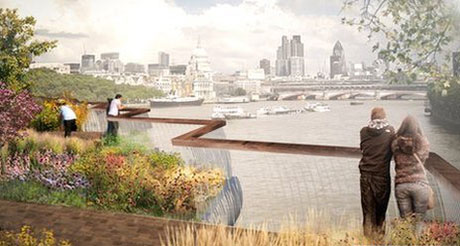
There was also the threat of a judicial review because the site next to the National Theatre is deemed as an asset of community value because it is space open to the public.
But local residents say that by building the Garden Bridge on that site, the open space would be lost.
Fortunately, the building work never did get underway.
*****
So what of those "demented enemies" that Mr Johnson spoke of when he appeared on his monthly phone-in?
There are a number of people unhappy that, in times of austerity, £60million of taxpayers’ money - £20 million of which is a loan - is being spent on a footbridge across a busy part of the Thames which will be closed at night.
Meanwhile, it becomes harder and harder to cross the river in east London, where two more river crossings are planned. (Incidentally, another Theo Usherwood exclusive is that those crossings have rocketed in price, from £250m to £1bn so that a handful of Russian oligarchs can sail their luxury yachts to St Katherine's Dock).
That was when things started to come unstuck for Boris's big project.
Kate Hoey, the MP for Vauxhall, where the bridge will land on the Southbank, told LBC: "A Garden Bridge might be a lovely idea, but it's not the right time, it's not the right place and local residents don't want it.
"This, I think you could use the word fiddling that's been going on, it definitely does need taking up.
"And I will definitely being getting on to the National Audit Office and the Public Accounts Committee as this is government money - both TfL's £30m and the Treasury's £30m."
Once Mr Johnson has left City Hall, people started to wonder how far the project would go. In the lead-up to May's Mayoral election, Sadiq Khan originally claimed he would scrap the bridge, before getting on board.
And once he became Mayor, Mr Khan looked into the figures and decided that the bridge was too expensive to cancel, with almost £40million spent without a spade even being put in the ground.
Speaking at his first Mayor's Questions, he said: "Of the £60million of total public funding, £37.7million has already been spent by the Garden Bridge Trust - £25.2million of which came from TfL and £13.45million from the government
"If we were to cancel the project today. that would have been spent for no benefit at all for Londoners.
"However, if we complete the Garden Bridge, then not only will TfL be paid the £20million loan by the Garden Bridge Trust, but they will also pay roughly £22million in VAT to the government. That would leave an ultimate cost to the taxpayer of £18million for completing the Garden Bridge, significantly lower than the £37.7million cost of cancelling it.
"It is clearly in the interest of taxpayers to complete the Garden Bridge."
*****
LBC's State of London Debate, hosted by James O'Brien, may have changed Mr Khan's mind, however as it left him in no doubt about how much Londoners disliked the project.
"The choice is this," Sadiq said to the room packed with over 2,000 Londoners. "Do we carry through the bridge being finished... at a taxpayer bill of £18m? Or cancel it now with £40m?
"That's the dilemma, I've got. Do I cancel it and waste £40m?"
Before the Mayor could finish, several loud members of the audience immediately roared: "Yes!"
One woman could then be heard warning Sadiq of "throwing good money after bad".
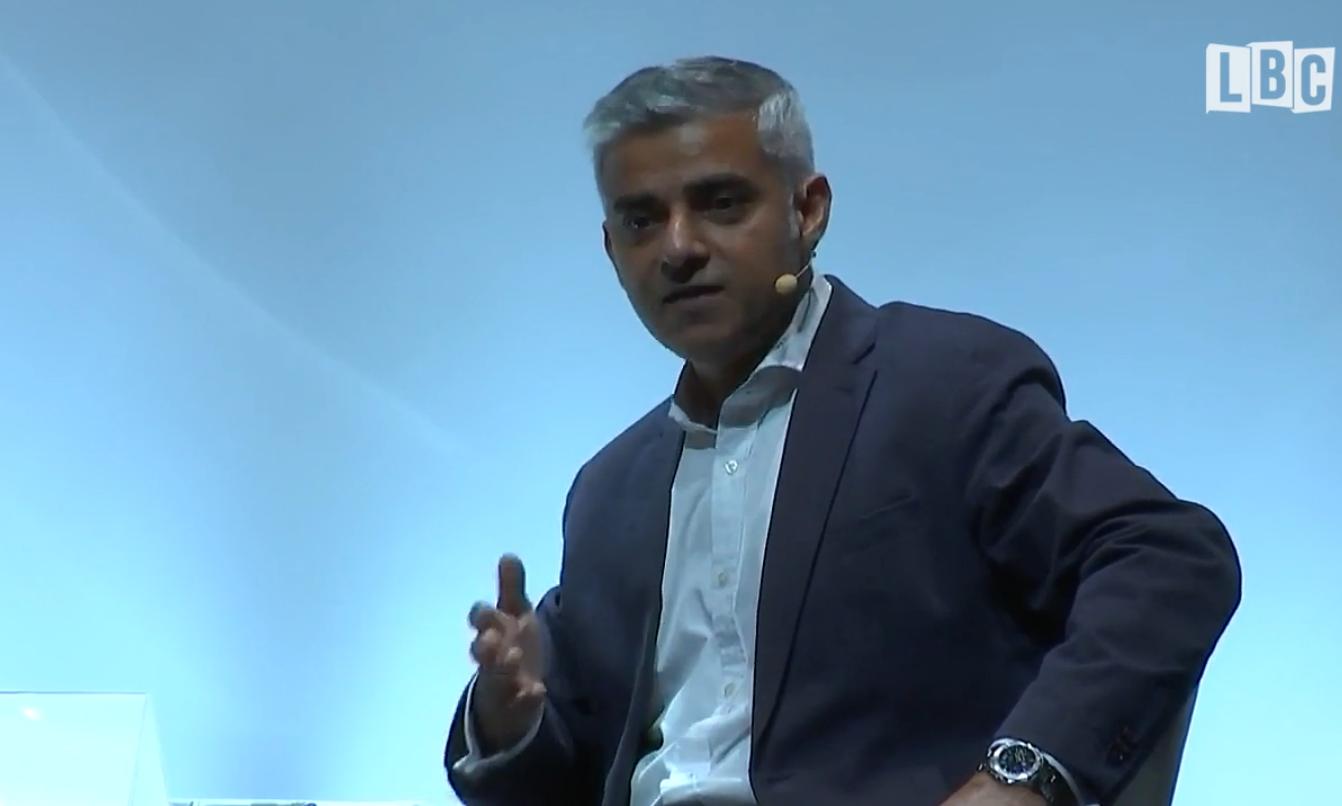
Indeed, speaking to James O'Brien a month later, Mr Khan admitted it was "not a state secret" that the bridge may now go ahead.
*****
Then Dame Margaret Hodge's report into the project came out.
In it, she says the cost of the bridge will now spiral north of £200 million. There is a blackhole of £70 million - and no hope of plugging the shortfall. More tax-payer cash will be needed, but cannot be justified and Mayor Khan has already ruled that out.
Dame Margaret also says that it is best that tax-payers accept a loss of nearly £50 million rather than risk further public money.
And crucially, London Mayor Sadiq Khan should not sign guarantees to allow work to start.
The report is damning for Boris and his team. It says that from the outset, there was no business case. And perhaps most damagingly of all, the trust entered into a contract with a construction firm, committing millions of pounds of public money while still not having secured the land to build the bridge, nor all the funds.
It is also astonishing, she says, that the trust was allowed to do so by the Mayor Boris Johnson and the Department of Transport.
A spokesperson for Sadiq Khan said: "The Mayor wants to thank Dame Margaret Hodge for this thorough report, which raises some very serious questions about the way the project has been handled. The Mayor will now take some time to carefully consider it and its implications."
So that's it.
The idea of the Garden Bridge sleeps with the shopping trolleys, wellington boots and other detritus at the bottom of the River Thames.
Now, the final cost of Boris' failed project has been revealed.
Transport for London stated that more than £53million was spent on the cancelled Garden Bridge project. All but £10m will be paid for by the taxpayers.